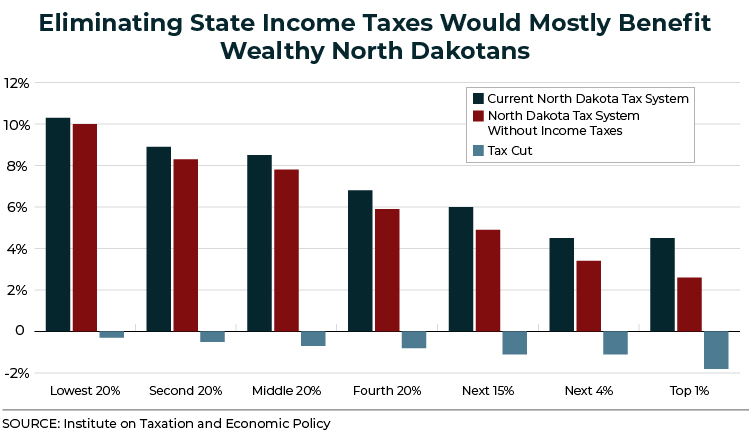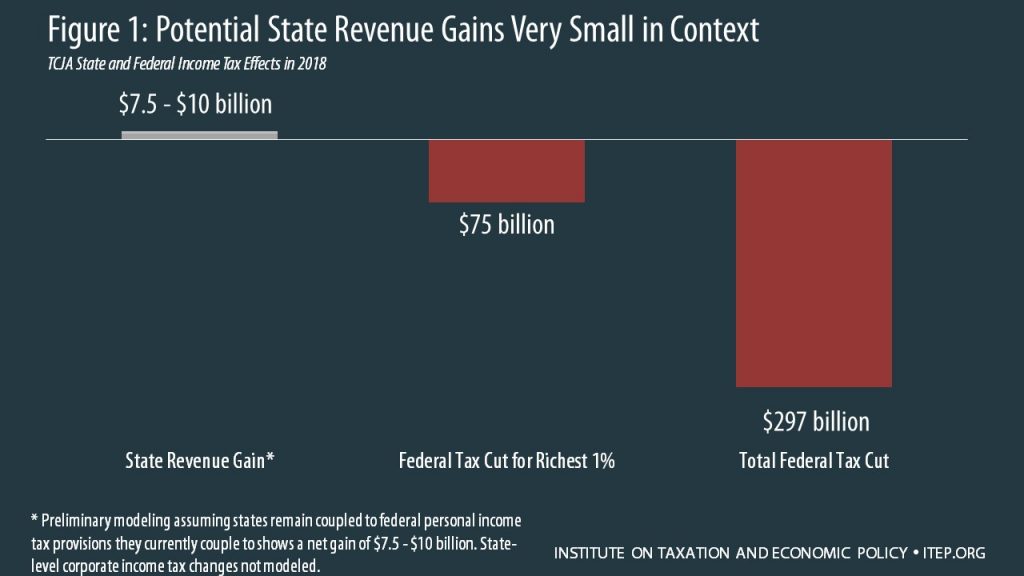Though a long winter and a rough start to spring weather have wreaked havoc in much of the country, lawmakers are off to a good start in the world of state fiscal policy so far. In the last week, a progressive revenue package was passed in the nick of time in NEW MEXICO, a service-sapping tax cut was vetoed in KANSAS, and a regressive and unsustainable tax shift was soundly defeated in NORTH DAKOTA. Meanwhile, gas tax updates are on the table in MAINE, MINNESOTA, and OHIO. And exemptions for feminine hygiene products and diapers were enacted in VIRGINIA and introduced in MISSOURI.
— MEG WIEHE, ITEP Deputy Director, @megwiehe
Major State Tax Proposals and Developments
- Citing her commitment to fiscal responsibility, KANSAS Gov. Laura Kelly vetoed the TCJA response / online sales / food tax rate reduction tax bill – a plan that could reduce state resources by $500 million over the next three years. Lawmakers are working to scrape together the votes for a veto override, but it remains to be seen if they can come up with the requisite votes. — LISA CHRISTENSEN GEE
- With only 10 minutes remaining in session, lawmakers in NEW MEXICO passed a tax bill that raises new revenue for critical public investments and includes several progressive tax policy improvements—including adding a new top income bracket in the case state revenues from other sources don’t hit certain targets, increasing the Working Families Tax Credit to 17%, paring back the deduction for capital gains, and requiring combined reporting for businesses. — LISA CHRISTENSEN GEE
- NORTH DAKOTA Senate leaders voted 41-4 last week (as we encouraged here) to defeat a bill approved by the House that would have used unstable and unsustainable oil tax revenues to phase out the state’s personal and corporate income taxes. — DYLAN GRUNDMAN
Governors’ Budget Proposals and State of the State Speeches
- DISTRICT OF COLUMBIA Gov. Mayor Bowser presented her proposed budget at the State of the District last week. The proposal includes a rate increase to commercial property taxes for properties valued at over $2 million. The rate increase from 1.45 to 2.5 percent is estimated to generate $79 million in revenue annually and would be used to fund affordable housing.
State Roundup
- ARKANSAS lawmakers have been busy passing another series of tax measures: one would increase cigarette taxes but offset it with tax cuts for low-income taxpayers including raising the standard deduction, lowering personal income tax rates, and enacting a state EITC; another would authorize the collection of sales tax from online retailers while also enacting various tax cuts for corporations, including lowering the corporate income tax rate, enabling more generous loss and apportionment provisions for multinational businesses.
- CALIFORNIA is among the states considering creating tax credits to offset the costs of caregiving. The New York Times has a story on seven other states that are considering similar initiatives.
- CONNECTICUT lawmakers are weighing options to legalize recreational cannabis, including steps toward regulation and taxation.
- DELAWARE lawmakers are again attempting to improve their Earned Income Tax Credit (EITC) after Gov. John Carney’s surprising veto last year. This year’s version gives residents a choice between the existing nonrefundable credit at 20 percent of the federal EITC and a 4.5 percent refundable version, so no one would see a decrease to their credit. The effort could be aided by a proposed increase in the qualifying age for an existing pension exclusion and a slight bump in the state’s revenue forecast.
- DELAWARE leaders are also looking again at a possible new tax on opioid manufacturers.
- Mayor Bowser of the DISTRICT OF COLUMBIA also announced during the State of the District that she would fund an exemption to diapers from the sales tax base passed by City Council in 2016. The diaper exemption is estimated to reduce revenue by $4.5 million.
- Suburban North GEORGIA voters are bucking a decades-long trend of approving county sales tax increases thanks in part to organized opposition from the far right.
- An IDAHO bill to conform to a corporate provision of TCJA passed the House and advanced out of committee in the Senate. House Bill 183 would provide the same tax break on foreign income for Idaho companies as the federal law established. It’s estimated to reduce state revenue by $135.4 million.
- In OHIO, the Senate version of the transportation budget lowers the fuel tax increase to 6 cents per gallon, down from the 18-cent proposal by Gov. DeWine and the 10.7-cent (20-cent for diesel) proposal by the House. The Senate bill, among other things, increases the state’s EITC to 30 percent of the federal credit and removes the existing cap. Lawmakers will spend this week sorting out differences between the proposals.
- Tax talk in LOUISIANA over the last few weeks has included discussions on centralizing the collection of local sales taxes, the need to address the lagging gas tax, and prospective ballot initiatives (including repealing the deduction for federal taxes paid and adopting a flat personal income tax).
- A gas tax is also being discussed in MAINE where lawmakers have proposed a seasonal gas tax aimed to collect revenue from summer tourists. Gas taxes are also the talk of the town in MINNESOTA where the governor’s proposed transportation plan and gas tax hike were taken up in legislative committee last week.
- A proposal in MISSISSIPPI to add a sales tax holiday for school supplies has drawn negative attention as a lawmaker called it “the least” the legislature could do for teachers forced to purchase classroom supplies.
- Several bills in MONTANA to give localities the option to levy sales taxes have died in session leaving local officials struggling to raise needed revenue from limited sources. Legislators also introduced a bill to increase the Social Security exemption on state income taxes.
- NEBRASKA’s 2019 tax debate is heating up with members of the revenue committee reportedly leaning toward a regressive sales tax increase to pay for property tax reductions, which would likely be vetoed by anti-tax Gov. Pete Ricketts if it makes it that far.
- NEW JERSEY Gov. Phil Murphy’s proposed millionaires’ tax has a long and interesting history and is supported by many in the state.
- Administrators in PUERTO RICO presented recommendations from the federal Treasury Department to eliminate the tax on tangible property and replace it with a land fee. The Treasury proposal would also decrease the tax rate for intangible property.
- RHODE ISLAND recently expanded legalized sports betting—becoming the fifth state to do so. Lawmakers in CONNECTICUT and NEW HAMPSHIRE are also laying the groundwork for legalizing sports betting in their respective states.
- TEXAS lawmakers may be headed for a session unless the House and Senate can reach an agreement on the state budget and the seemingly diametrically opposed goals of increasing school funding and decreasing property taxes.
- The House tax panel in VERMONT passed a bill approving a paid family leave program. The proposal would be funded by a 0.93 percent payroll tax.
- With Gov. Ralph Northam’s signature this week, VIRGINIA became the latest state to reduce or eliminate taxes on feminine hygiene products and diapers. MISSOURI could be next.
- WASHINGTON State House Democrats released their budget proposal, including an “extraordinary profits tax” on the sale of stocks and bonds by high-income households. The Senate should respond with its own plan later this week.
What We’re Reading
- Did you know that unfair state and local tax systems also exacerbate racial inequalities? ITEP’s Misha Hill explains.
- Relatedly, observers in Florida and at the New York Times are likening a proposed set of financial and administrative hurdles for Florida residents with felony convictions registering to vote (who were recently re-granted that right in a statewide referendum) to a poll tax—an institution with a racist and anti-democratic legacy of denying black Americans the franchise.
- New York State’s proposed pied- à –terre tax receives support from the Fiscal Policy Institute and the New York Time’s editorial board.
- The Rockefeller Institute has a new interactive tool out for exploring how teacher salaries have changed (usually for the worse) in each state over the past 15 years.
- The Center on Budget and Policy Priorities has updated its report on how and why states should invest in infrastructure.
- Although President Trump’s federal budget is considered “dead on arrival,” the funding cuts included and the general trouble it spells for state and local budgets are sobering reminders of very live issues on the horizon for states and cities as a result of the federal tax cuts that will inevitably force funding cuts of this nature.
- Governing reports on the lack of oversight and evaluation of business tax subsidies in many states.
- A recent publication by Policy Matters Ohio shows the impact of the Senate’s transportation budget on public transit and the state’s Earned Income Tax Credit.
- In a recent report, the Budget and Tax Center makes the case for a graduated income tax in North Carolina.
- The Iowa Policy Project has two new reports out: one showing how a proposed property tax cap would undermine local control and funding for vital public services, and another setting the record straight about the wealthy few who would benefit—and the many whose services would suffer—from repealing the state inheritance tax.
If you like what you are seeing in the Rundown (or even if you don’t) please send any feedback or tips for future posts to Meg Wiehe at [email protected]. Click here to sign up to receive the Rundown via email.





